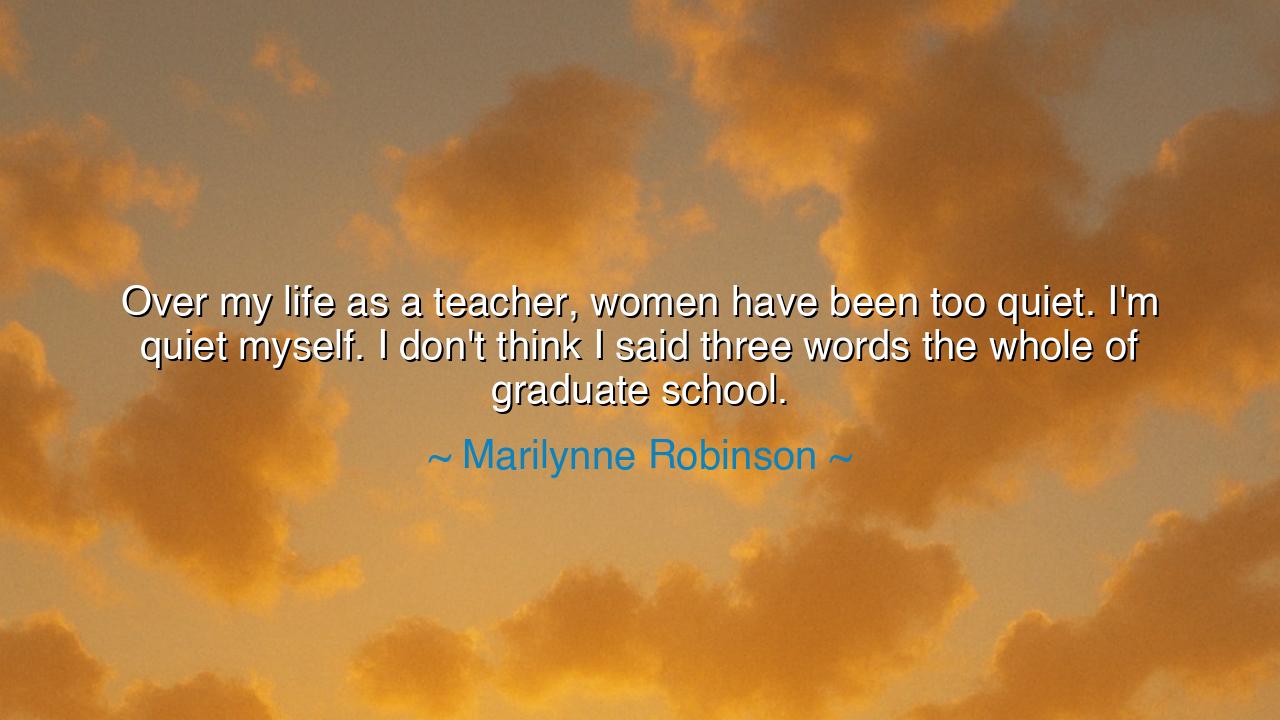
Over my life as a teacher, women have been too quiet. I'm quiet
Over my life as a teacher, women have been too quiet. I'm quiet myself. I don't think I said three words the whole of graduate school.






Marilynne Robinson, with the quiet gravity of a thinker who has lived both silence and speech, declared: “Over my life as a teacher, women have been too quiet. I'm quiet myself. I don't think I said three words the whole of graduate school.” These words speak of the long shadow of silence, a silence born not of lack, but of hesitation, fear, and the weight of social expectation. It is not that women have lacked wisdom or depth, but that their voices were too often restrained, hidden beneath humility or intimidation. Robinson’s confession is at once personal and universal: she embodies in her own silence the silence of many, and in her teaching she has witnessed its persistence.
The origin of this reflection lies in Robinson’s dual experience as both student and teacher. As a student, she bore the burden of being quiet, of watching words pass her by while her own remained unspoken. As a teacher, she saw the same struggle in her female students—the reluctance to speak, to interrupt, to claim space. Her words reveal not condemnation but compassion, for she knows from her own life how deeply silence can root itself in the soul, how hard it can be to break. Thus, she calls not only attention to the silence, but to the need for courage in voice.
History bears witness to the dangers and losses of such silence. Consider Hypatia of Alexandria, the philosopher and teacher of the ancient world, who broke the silence by speaking boldly in the realm of mathematics and philosophy, in a time when women’s voices were often suppressed. Her courage led to her tragic death, yet her name endures as a beacon of what happens when one dares to speak. Or recall Emily Dickinson, who lived in seclusion, her poems largely unheard in her own time. Her quietness shielded her, but also delayed the recognition of her genius until after her death. These stories remind us that silence can hide brilliance, and that society is poorer whenever voices are stifled.
Robinson’s own admission—“I don’t think I said three words the whole of graduate school”—is powerful because it comes from a woman of immense intellectual and literary influence. It tells us that even those who later rise to prominence often began in silence, and that quietness does not mean emptiness. Yet it also warns us of the cost: had Robinson remained silent, had she never found her voice through writing and teaching, the world would have been deprived of the wisdom of her novels, essays, and lectures. In her life, we see both the weight of silence and the triumph of overcoming it.
The emotional force of her words lies in their honesty. She does not present herself as a heroine who always spoke boldly, but as one who understands the struggle of being voiceless. In this, she reaches the hearts of those who feel the same—those who sit in rooms with much to say but no strength to say it. She reminds us that silence may be common, but it must not be permanent. The courage to speak may come late, but it can still transform lives and enrich the world.
The lesson for future generations is clear: do not be too quiet when wisdom burns within you. Whether you are a woman or a man, young or old, your voice carries something unique that must not be hidden. To remain silent out of fear or doubt is to rob both yourself and others of truth. Speak, even trembling; write, even if unsure; share, even if your words seem small. For small words grow mighty when joined with honesty and courage.
Practically, this means cultivating spaces of encouragement. Teachers must draw out the voices of their students, especially those who linger in silence. Families must nurture children not only to listen but to speak with confidence. Individuals must practice courage daily, daring to contribute in classrooms, workplaces, and gatherings. By breaking the habit of silence, we break the cycle of invisibility.
Thus, Robinson’s confession becomes a call: though she once lived in silence, she urges others not to remain there. The world needs your voice. Do not wait until it is too late. Speak your three words, your thousand words, your truth. For in every voice raised with sincerity, the quiet corners of history are filled with light.






AAdministratorAdministrator
Welcome, honored guests. Please leave a comment, we will respond soon